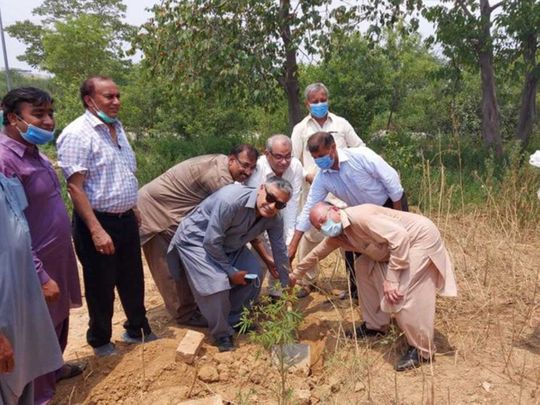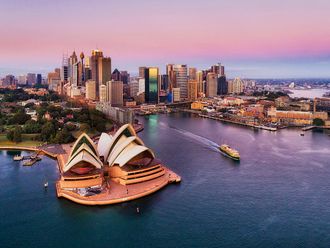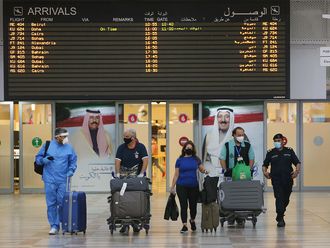
Islamabad: The Islamabad High Court (IHC) has disposed of three separate petitions against the construction of a Hindu temple in Islamabad, putting an end to the controversy for now.
The objections were mainly over the allotment of land, which were dismissed by IHC Justice Aamer Farooq on Tuesday.
In its verdict, the court observed that the construction of a place of worship requires mandatory approval from the Capital Development Authority (CDA), which was not obtained in this case, due to which the construction was halted soon after the groundbreaking ceremony. The construction activity was stopped until a formal approval for the building was issued, the CDA counsel said.
“The fact remains that no construction at present is taking place at the site in question and is unlikely to commence till compliance is made with terms of allotment and Capital Development Authority laws,” the court noted.
The petitioners questioned the allotment of the plot, citing that it was not included in the city’s masterplan. The court, however, noted that when the authority develops the area, it decides through its board and layout plans what each sector or sub-sector and the plot therein may be designated for.
Officials reiterated that the plot was not allotted solely for a temple, but also for a community centre and a place for cremation — a long-standing demand of the minority community.
Hindu community welcomes court verdict
Leaders and members of the Hindu community in Pakistan highly welcomed the court decision.
Speaking to Gulf News, member of the National Assembly, Dr Ramesh Kumar Vankwani, called the verdict “a strong message” that all citizens regardless of their religion and race are “treated equally in Pakistan”. He said, “The judiciary has given its verdict, now the state must exercise its writ to protect the rights and concerns of all citizens.”
Lal Chand Malhi, a Pakistan Tehreek-e-Insaf (PTI) member of the National Assembly and Parliamentary Secretary on Human Rights, who laid the foundation stone for the construction of the temple, also hailed the decree. “Hindu community welcomes the court verdict and vows to follow it in letter and spirit,” he tweeted and his tweet received several congratulatory messages.
Human rights activist Kapil Dev, who raised concerns about the issue on social media, said: “I am genuinely thankful to all my Muslimfriends who have shown their continuous support on the templeissue. This really makes us feel we are not alone and joined by many like-minded progressive people in the cause. InshaAllah! Together we will revive Jinnah’s Pakistan for all.”
Decision hailed by Pakistanis
Many Pakistanis hailed the decision as a step towards a tolerant and progressive Pakistan after the opening of the Kartarpur Corridor for the Sikh community and reopening of an ancient temple in Sialkot after 72 years.
Speaking to Gulf News, Muhammad Ibrahim Qazi, a commentator on current affairs, said: “Islam is today often misunderstood because of destructive activities of those with little or incorrect knowledge of Islam, who the public considers as representatives of Islamic ethos.” He urged Muslims to take inspiration from Prophet Mohammad (PBUH) who had said that “whoever is cruel towards non-Muslims and, curtails their rights, or takes anything against their free will; I (Prophet Mohammad) will complain against the person on the Day of Judgment.”
Controversy behind the temple
Islamabad’s first Hindu temple became a controversial issue soon after its groundbreaking ceremony on June 23. The construction was halted following court petitions against the temple construction and reaction from religious and political figures. To resolve the issue, Minister for Religious Affairs, Pir Noorul Haq Qadri, held a meeting with Prime Minister Imran Khan who directed the relevant authorities to consult the Council of Islamic Ideology (CII).
Reaction on intolerance and criticism on the temple
Pakistan as a state and government would protect the rights of minorities as enshrined in the Constitution, said the spokesperson for religious affairs. Pakistan’s minister for religious affairs said: “We distance ourselves from those who want to spread violence. The act of a particular person should not be associated with any sect”.
Commenting on the religious intolerance and hostility witnessed against the new Hindu temple in Pakistan, Qazi said it was “a politically motivated” move “to draw a wedge in the existing interfaith harmony” enthused due to “violence against Muslims” in different countries. At the same time, he urged the government to take notice of the fact that the small number of Hindu population in Islamabad is deprived of basic social welfare necessities and the already existing temples are in a poor state.
Article 20 of Pakistan’s Constitution says minorities are entitled to profess, practise and propagate their religion with freedom, which is subject to law, public order and morality.
Key facts about the temple:
— The 20,000 square feet of land was initially allocated for the temple in 2017.
— The land was handed over to Islamabad Hindu Panchayat in 2018.
— The land was allotted in 2017 at the request of the Ministry of Human Rights after Hindu members of parliament filed an application for the construction of a place of worship and later also requested the ministry to allocate funds for its construction.
Issue of funding of the temple
The allotment of land and the funding of the temple by the government were the two major concerns of critics. Deputy Attorney General Raja Khalid Mehmood Khan, representing the federal government, confirmed that no funding had yet been disbursed by the federal government for the temple. The federal government matter has been referred to the Council of Islamic Ideology that “will decide whether or not the temple will be constructed by using state funds”, he had said.








